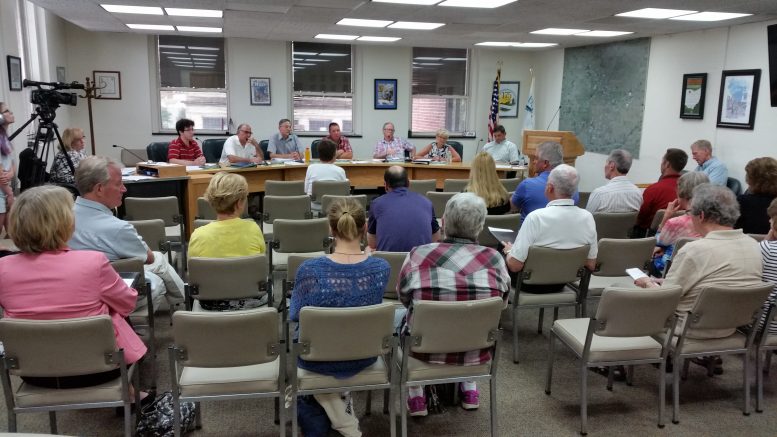By JAN LARSON McLAUGHLIN
BG Independent News
It will be up to Bowling Green voters to decide the fate of city charter updates. But before that can happen, City Council has to iron out some wrinkles in the proposed charter changes.
Some of the wrinkles are relatively small – but others reveal a big divide.
Council’s Committee of the Whole met prior to the council meeting Monday evening to go over all the charter changes that would go on the November ballot for voters to decide.
Some slid through rather easily. But one hit a roadblock that was insurmountable Monday evening.
The biggest divide was over a charter change that would add the description of the planning department. However, the language put before council was drastically cut from what had been proposed by the charter review committee. Jeff Crawford, co-chair of the committee, said the intent was to have a more detailed description of the planning department.
Council President Mike Aspacher said the recommendation from the committee had been turned over the City Attorney Mike Marsh to prepare it for legislation.
Marsh trimmed the language to be consistent with the other city departments in the charter, and to take out specifics.
“We don’t want to limit what the job is,” Marsh said.
But some council members objected to the language being watered down.
By defining the position, the city is making a commitment, council member John Zanfardino said.
“It addresses issues in Bowling Green that need to be spelled out,” he said. “It was included by the group for a reason. We’ve talked about housing for the 13 years I’ve been on council.”
The city “flirts with” regulations, but never goes further, Zanfardino said.
Les Barber, a member of the charter review commission, admonished council for taking out the detailed definition of the planning department.
“I was really disappointed,” he said upon seeing the change. “Critical language had been stripped away. Frankly, I had expected better from this city government.”
Barber accused council of “bureaucratic defensive resistance to change.”
The city charter has had no mention of the planning department since its creation in the 1970s, he said. Barber blamed that omission for the city’s “ineffective” planning.
“Its removal is a blow,” he said.
Better planning could have enabled the city to better respond to BGSU’s policy change 50 years ago to allow more students to live off campus. That change was “devastating” to the East Side of the city, he said.
Single family homes were converted into rental units, he said. “Citizens’ warnings fell on deaf ears for decades,” Barber said. “There’s a blight in large sections of Bowling Green.”
The planning department needs to be strengthened, he said. The city has a professional planning director – Heather Sayler – but the city needs to make a commitment to the department to protect the integrity of the community.
Council member Bruce Jeffers objected to the claim that the city hasn’t focused on planning.
“I think we have taken planning seriously,” Jeffers said, listing off the recent Community Action Plan and the city land use plan that have been completed. He also said Mayor Dick Edwards has worked on planning since he took office.
“We take it seriously, and I think we’re doing a lot of good work,” Jeffers said.
Jeffers agreed there are problems that haven’t been fixed. “All of the neighborhood issues aren’t resolved in Bowling Green,” he said. But that is typical of college towns, he added.
Mark Hollenbaugh, a member of the charter review committee, also pushed for the original language, saying it would signify the commitment by the city for the planning department.
Hollenbaugh also noted what he saw as a different response by council to the efforts of the charter review committee. Initially, council members said “our intent is to accurately reflect the will of the charter committee,” he said. However, that is now being followed up by “but … but … but.”
Council member Sandy Rowland voiced her concern that council was originally told the charter changes would be based on the will of the charter committee.
But council member Greg Robinette pointed out that no other city department has the job description as part of the city charter.
“The charter is not the place to tell the planning director their job description,” Robinette said.
Aspacher said he was inclined to vote in favor of the shortened language provided by the city attorney.
Council member Bill Herald suggested greater detail about the planning department could be put in the form of a resolution.
Aspacher asked that the matter be tabled until the July 2 council meeting.
Council also debated over a charter update changing the credit given to veterans during the hiring process from 20 percent to 10 percent. That would deviate from the 20 percent credit set in the Ohio Revised Code.
Robinette, a veteran himself, said he was initially concerned about the change. However, both the fire and police chief, along with veteran John Fawcett on the charter review committee, backed the change with “good solid reasoning.”
“This change still rewards veterans,” Robinette said.
Jeffers, Rowland and Zanfardino said they were also concerned about the change.
“I was alarmed initially,” Rowland said. “This is in no way disparaging to our veterans. It’s touchy to take something away from a veteran.”
Hollenbaugh asked that council change the wording of the charter ballot language so it doesn’t just mention the 10 percent credit, but accurately reflects that the veterans credit is being reduced from 20 to 10 percent.
Council passed the ordinance without that wording change.
Other proposed changes to the city charter made it through council’s approval Monday:
- Changes the time a council member elected to fill a vacancy can remain in the position. The charter currently allows them to remain in the seat for the unexpired term.
- Increases the number of people who make the top tier of applicants for Civil Service entry positions from three to five. The police and fire chief approve of this change.
- Requires a charter review committee to meet at least once every 10 years.
(Editor’s note: A story will follow on the debate over including a non-discrimination section in the the charter preamble.)





